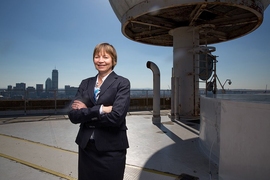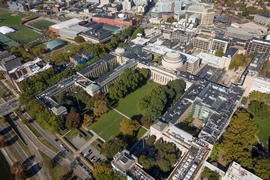On Jan. 19, some 35 members of the MIT community spent a day getting creative and collaborative on solutions to carbon emissions and climate change at the Hackathon for Climate.
The all-day event — hosted by the Environmental Solutions Initiative (ESI) and the Climate CoLab — invited community members to come together on the topic of climate change.
“This is a big challenge, but there are a lot of smart people thinking about it,” said John Fernández, director of the ESI. “Yet, here at MIT there are wellsprings of energy and interest on the environment that are not fully tapped.” With this event and others like it, Fernández hopes to give these individuals an outlet for their ideas and passion.
“What we’re trying to do is create a mechanism and a system for tapping that energy, that passion, and all that intelligence and creativity to solve one of the world’s biggest problems,” said Thomas Malone, the Patrick J. McGovern Professor of Management and founder and principal investigator of the Climate CoLab.
Participants included MIT students, faculty, staff, and alumni. Participating as “coaches” to facilitate the generation and development of ideas were professors Harriet Ritvo, Steven Barrett, Elfatih Eltahir, Ari Epstein, Bob Jaffe, David McGee, and MITEI Director of Research and Analysis Frank O’Sullivan.
“I’m delighted that we get to do this today, and hopefully in the future, to add value to the community by linking up,” said Amanda Graham, executive director of the ESI.
Novelty, creativity, and impact
The event kicked off with a session of idea generation where attendees wrote down and posted their ideas on the walls. After looking around and sharing ideas, people made quick pitches for the idea of their choice and recruited team members.
Of the tens of ideas, teams emerged around five. One group came up with an app idea to encourage and optimize home gardening that they dubbed “Farmville Live,” after the popular virtual farming game.
“The app would try to persuade people who either don’t garden or don’t garden very much to start growing just a few tomato plants in their backyard,” said team member Casey Stelmach, a graduate student in management. “The app would calculate potential yield based on where you are, recommend the most low-maintenance garden, and use a leveling system that encourages consumers to start small and — if they get really into it — start growing more and more food in their garden.”
Another team presented the “CliMITbit,” or as they put it, the “Fitbit of sustainability,” an app that would provide a user with an estimate of his or her comprehensive carbon footprint.
“We were taking the idea of personal monitoring, like a calorie counter app, and trying to translate that into carbon emissions,” said team member Katie Arthur, a graduate student in Comparative Media Studies and Writing. “We looked at food, transport, and energy in the home — the three biggest places that Americans emit carbon emissions. We wanted to allow users to be able to track that.”
The other teams included a group called FLY ECO that looked at harnessing energy from airplane landings; a team that envisioned a website comparing local options for transport and home energy; and another that explored shipping by helium dirigible.
After four hours of research and discussion, teams presented their proposals and took questions from judges and the audience.
“What we were trying to do here was generate ideas, and I am really pleasantly surprised at the uniformly good quality of the proposals that came out of this process,” Malone said.
The FLY ECO team received an award for the most novel idea, while the Farmville Live team was recognized for the best presentation. The “Grand Prize” went to CliMITbit — the proposal that the judges deemed had the most potential impact.
Bringing the community together
The Hackathon for Climate is one of the first events convened by ESI, which was launched in May 2014. The first phase of the initiative established a multidisciplinary research program and laid the groundwork for an environment and sustainability minor. Now, ESI is adding community events and engagement to its portfolio.
The hackathon came after a number of other environment and climate-oriented events during Independent Activities Period (IAP) in January, including a student-organized series of climate science and policy “101” seminars and a daylong symposium sponsored by the Department of Earth, Atmospheric and Planetary Sciences. With this timing, ESI aimed to help create a unified experience for MIT community members.
“Coherence needs to be created,” said Graham. “How do we create pathways for people that bring these things together, to get the value of the whole to be greater than the sum of its parts?”
The event aimed to do the same with its participants, bringing together a diverse body to collaborate on a shared problem.
“The diversity of communities that were represented in the group — students, faculty, staff, and alumni from all five MIT schools — was astounding to me,” Fernández said. “And the enthusiasm throughout all of those communities was very high.”
“Bringing together a whole range of people across ages, across disciplines, across roles — I think that is a really exciting and potentially really powerful thing for an initiative to do,” Malone said.
From idea to proposal
The co-sponsor of the event, Climate CoLab is a project of the MIT Center for Collective Intelligence. It supports a quickly growing, worldwide community of over 50,000 people who use a Web-based platform to develop and evaluate proposals for how to address climate change. Proposals are judged by a group of experts who give participants feedback; contest winners receive cash prizes and other support for their projects. The hackathon on Friday was a chance to generate ideas, which participants can then refine and submit as proposals on the site.
“Students have much to contribute to the conversation of what to do about climate change, and we want to see more of their work on the platform,” said Laur Fisher, project manager of the Climate CoLab. “We have some of the world’s leading experts on climate change-related fields, and if your proposal gets entered into a contest, you can get feedback from these people.”
At the close of the event, Fernández and Malone invited participants to reach out if interested in pursuing their proposal further. “We’re very serious about taking these projects forward,” Fernández said.
“We view this as a way for the Climate CoLab to include more support for the ideation process that leads to good proposals: Where do the good ideas come from, and how do the teams get formed?” Malone said. “I’m very pleased with how well this worked, and we’re now talking about how to do more of this.”













